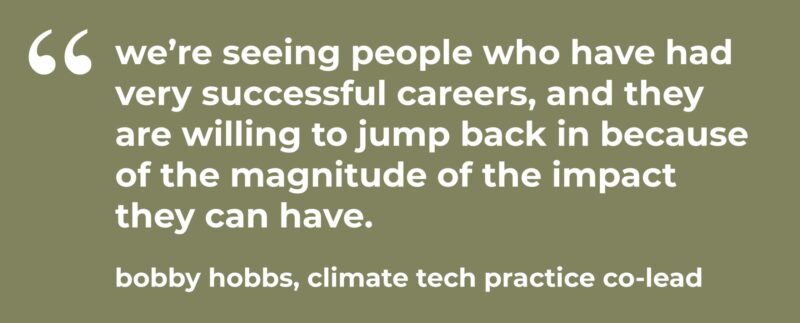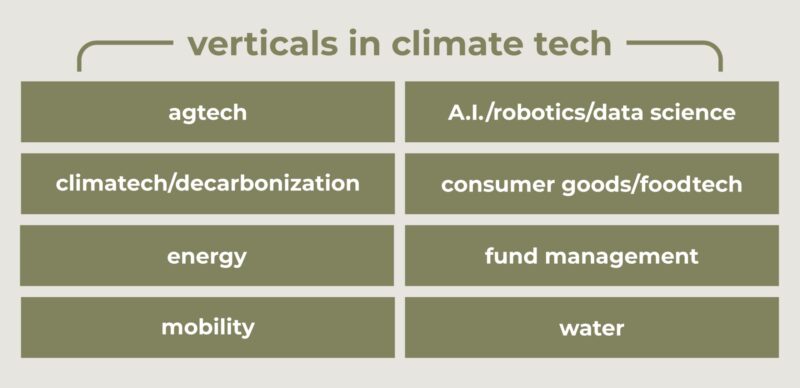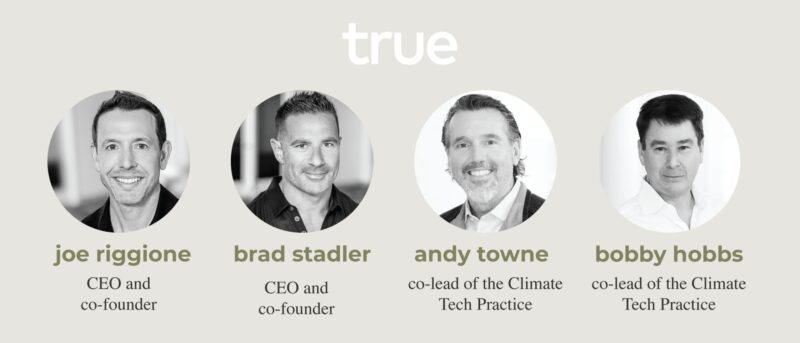Climate Tech is having its moment, not a moment too late.
The talk about climate change can be bleak, but talk to Climate Tech practice co-leads Andy Towne and Bobby Hobbs for three minutes and you’ll be energized with optimism. The world’s future is bright, because the momentum behind the creative solutions to sustain our planet is finally here.
“Climate technology is the most important category in the world,” said Towne. “People get it now, and they want to be involved.”

Money Makes Momentum
People are becoming wise to the potential profit and possibilities of climate technologies in the global effort to reach net zero global emissions by 2050. A record-level $60 billion in investments went into climate startups in the first half of 2021, according to PwC, with the average deal increasing to $96 million. Fourteen cents of every dollar in VC funding went to climate tech in that period.
BlackRock CEO Larry Fink predicted the next 1,000 unicorns will be climate startups helping the world decarbonize and energy-transition. In his annual letter to investors, Fink wrote, “we focus on sustainability not because we’re environmentalists, but because we are capitalists and fiduciaries to our clients.”
Fink is following through with Decarbonization Partners, a True client and one of the largest venture-capital funds dedicated to carbon-cutting technologies. And a club of billionaires led by Bill Gates has catalyzed investment in the space since they launched Breakthrough Energy in 2017 to help scale clean energy transitions. Their example made other investors take notice.
“You’ve got the capital behind the category now,” said Hobbs. “Ask almost any institutional investor and they have a sustainability or climate thesis they’re acting on.”
Hiring From Everywhere
All this investment means climate tech portfolio companies are hiring for growth. And recruiters are confronting the same problem they are facing in other innovative spaces: the supply of people with this exact experience is not meeting demand.
“We’re constantly taking the best talent from other industries,” Towne said. “We’ve had to go out and find people that have done relevant, synergistic things, because they saw the purpose and the impact that they can have on global climate.”
More people from all tech backgrounds are jumping into climate, and they’re bringing new technologies and ideas with them. Common targets for recruiters: people working with subscription-based SaaS models and people in food tech. The semiconductor industry and robotics industries have lots of crossover too. And plenty of people come with experience from traditional technology companies like Microsoft, Apple and Google, and B2B, or B2C businesses.
AI experience is also particularly sought after in the climate tech space currently, with some of the most exciting companies using artificial intelligence to predict climate situations and find solutions. True’s client Cervest is an AI-driven platform that promises to quantify climate risk across time down to the asset level. Wondering what the climate will be like in 30 years? Cervest predicts 75% of the world’s major cities will shift into different climates – with London feeling like Barcelona, and Madrid feeling like Marrakesh.

Leaving a Legacy
Recruiting in this space sometimes tells a story of generations.
GenZ and Millennials have come of age with a greater understanding and concern for climate change (Pew Research Center). Those younger generations drive climate activism and are drawn to roles in climate tech’s mission-driven work. Then there is a more experienced generation that wants to leave a legacy—or to right the wrongs of the past.
“I’m getting calls from oil and gas people every day,” said Towne. “Some feel guilty about where they took their income over the years—now they want to change the mark they leave on the world.”
Those who worked in traditional energy companies sometimes come out of retirement to join boards of companies designed to reduce emissions, adapt to the impacts of climate change, or enhance our understanding of the climate.
“We’re seeing people who have had very successful careers, and they are willing to jump back in because of the magnitude of the impact they can have.” Hobbs said.
True candidate David Eichinger built his career at Exxon and Enron and now is CFO for Divert, a food waste solutions company. Eichinger says he made the switch because he’s following the momentum.
“In climate tech, things move more quickly because there’s enough capital to do things like putting teams together and executing plans,” Eichinger said. “In oil and gas, there’s a hurdle to get things done. Because of the capital investment and the innovations within the industry, climate tech is an exciting place to be.”
Mission-driven work, the opportunity to make drastic change in the world, and the chance to join a booming industry are propelling leadership from all categories into this space.

A Brighter and Greener Future Together
The climate tech industry is booming right now because of the money and talent pouring into it. At True, we help our clients transition into and navigate through this space, at a time when climate innovations are more crucial than ever.
“Climate technology has proven to be a major asset class that can offer significant financial returns along with the opportunity for environmental and social impact,” said True CEO and co-founder Brad Stadler, “Our Climate Tech practice can help companies and candidates navigate the great opportunities available during this time of great change.”
“Our Climate Tech practice offers a chance to do good, at a time when the world needs it most, ” said True CEO and co-founder Joe Riggione. “The future is looking more optimistic with every person who has shifted their focus to building climate technology and a more sustainable world.”
To connect with True opportunities in climate tech please reach out to Andy Towne and Bobby Hobbs directly or, express your interest in open roles through AboveBoard.com.
